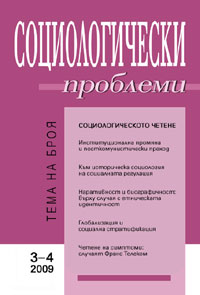Хабитуализираната афективност: феноменологическият тласък в „диспозиционната философия на действието“ на Пиер Бурдийо
Habitualized Affectivity: the Phenomenological Thrust in P. Bourdieu’s ‘Dispositional Philosophy of Action’
Author(s): Svetlana SabevaSubject(s): Social Sciences
Published by: Институт по философия и социология при БАН
Summary/Abstract: Following the trace of Pierre Bourdieu’s unfinished dissertation on The Temporal Structures of Affective Life, the article traces the phenomenological thrust in the philosophical dimension of the theory of practice, defined by Bourdieu as ‘dispositional philosophy of action’. The network of concepts is destructed which, according to remarks of Bourdieu himself, has a phenomenological origin: time, possibility, corporeality, urging character of the world. Against the background of the phenomenological analytics of human dispositions as proposed by Sartre and Heidegger, the concept of habitualized affectivity is thematically outlined, a concept which – together with the dispositional understanding and reflexivity as discussed in The Weight of the World – represents the most essential contribution of Bourdieu to the anti-Cartesian turn in the theories of action. At the same time, however, the ontologization of the ‘epistemological break’ and the dualism of ‘theory’ and ‘practice’ leads to specific aporias entering the core of his praxeological project and putting under question his scientist ideal of ‘objectivity of a higher order’. The way out of these could be sought in a theory of the non-coincidence between objectifying and unobjectifying (‘elementary’) reflexivity, the latter freeing up a space also for the uneliminable affective and ethical foundations of a theory or of what can be called thinking under the sign of Event, respectively a figure of fractal sociality – the one ‘between Kabylia and Paris’. Thus, not only the hermeneutical circle of the destruction proposed here would become closed; more importantly, we would become protected from the dangers of a ‘generalized Bourdieuism’.
Journal: Социологически проблеми
- Issue Year: 41/2009
- Issue No: 3-4
- Page Range: 29-49
- Page Count: 21
- Language: Bulgarian
- Content File-PDF

